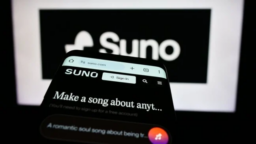It would have been the most talked-about story to hit the music business in decades.
Three years ago, the world found out that Google had made a play to buy 50% of Sony/ATV Music Publishing from the Jackson Estate. The stake, which eventually went to Sony Corporation in a $750 million deal, would have seen Google – now Alphabet, the world’s fourth largest company – acquire ownership of over two million copyrights, including a deluge of hits going back decades.
“We had discussions with [Google] in the selling of the Michael Jackson interest to Sony/ATV,” revealed heavy-hitting US lawyer Joel Katz at annual music biz conference Midem in the summer of 2016. “It would have been a very interesting proposition, [Google] having a major interest in a major publishing company like that… then negotiating with the record companies and saying: Hey, we don’t have to license you!”
Katz was referring to Sony/ATV’s gargantuan industry clout, as it effectively has a power of veto over every track and album related to its copyrights. As such, had Google bought into Sony/ATV, it would have acquired part-control of much of the music business – and often been able to dictate to the major record companies when and where their biggest hits were permitted to appear.
Today, the music industry is focused on the sale of another 50% stake: that of Universal Music Group, owned by French media empire Vivendi. The Paris-based multi-national is in the process of selling up to half of UMG, which owns the world’s biggest recorded music catalog, and the world’s second largest publishing company. Once again, Google’s name is being mentioned as a potential acquirer – alongside the likes of Tencent, Alibaba, Liberty Media, Apple and Verizon.
What makes any marriage between Alphabet/Google and Universal so captivating, from a melodramatic point of view, is the long-running bad blood between the music business and YouTube. Google-owned YouTube is the largest music streaming service on the planet, yet draws heavy criticism for what it pays out to songwriters and artists. Around 1.6 billion users each month play “free” (i.e. ad-funded) music on YouTube; they also access more music, in terms of total worldwide listening hours, than the consumers of every other audio and video streaming platform combined.
Yet, according to U.S. recorded music trade body the RIAA, YouTube pays out seven times less than Spotify on average, per-play; others suggest that this per-stream royalty works out as low as $0.00074. Plus YouTube (through little fault of its own) is the Number One destination for audio “stream-ripping,” the fastest-growing form of music piracy in the digital world.
“Stream-ripping, and a lack of accountability for many Big Tech companies that drive down the value of music, remain serious threats as the industry strives for additional growth,” said RIAA chief Mitch Glazier recently – in a barb almost exclusively aimed at YouTube.
Although YouTube has now launched its own $9.99-per-month subscription app, YouTube Music, tensions remain high with music rights-holders. Most of the industry supports the ascension of Article 13 – part of new legislation in Europe designed to force “user upload” services like YouTube to face legal responsibility for all copyright-infringing material on their platforms.
If Article 13 passes in its current form, say its supporters, large music rightsholders will be in a far better negotiating position next time they sit down to strike a global licensing deal with Google. (It’s a complicated topic, but essentially it will give the likes of Universal, Sony and Warner more control over how their music appears on YouTube and, therefore, a better chance at negotiating higher royalty rates.)
But what if Google ends up buying 50% of Universal Music Group? Or indeed, ends up buying the whole of Universal Music Group? (Some suspect that Vivendi will dispose of the whole of UMG for the right price, which would likely sit at around $40 billion.) What strategic imperative might Google have for paying a vast amount of money for UMG?
An alarming clue may lie with Liberty Media – the US-based majority owner of SiriusXM and Pandora. Liberty CEO Greg Maffei was recently asked by an analyst what benefit the purchase of a stake in UMG might bring to his business. “If you look at [SiriusXM], one of the largest, if not the largest cost they have is to the content suppliers,” he replied, “[so] understanding how you might hedge some of those costs is interesting.”
Apply that to YouTube: should Article 13 pass (and a version of the bill is expected to be rubber-stamped in the months ahead), Google/Alphabet’s ability to place direct leverage on the world’s biggest music rights-holder, potentially keeping music licensing costs as low as possible on YouTube’s free tier for years to come, might prove a tempting incentive.
Meanwhile, the record industry is fast falling out of love with ‘free’ music. The likes of Goldman Sachs have predicted vast financial upside for record companies over the next decade, primarily driven by hundreds of millions of new consumers putting their hands in their pockets and paying for subscriptions to the likes of Spotify and Apple Music.
Culturally, however, this paid model is in contrast to Google’s heartland. A peek at Alphabet’s finances reiterates how reliant the global Google business is upon advertising, as opposed to subscription. Of the company’s total $39.3 billion revenue generated in Q4 2018, advertising made up 83 per cent ($32.6 billion).
YouTube’s great hope for the future is that the $195 billion spent on TV advertising worldwide last year will increasingly migrate to free digital video. Judging by music (and music video’s) popularity amongst YouTube’s current users, a strategic relationship with the world’s biggest recorded music company could come in very handy in this mission.
Apple, Liberty Media and Tencent remain the most likely buyers of a stake in Universal, say industry whisperers – but Google is, for many in the music business, a troubling dark horse in the race.
Lending credibility to the idea, Google has recent history of investing in music companies: in 2015, Google Ventures led a $60 million funding round into Universal rival Kobalt Music Group (which now turns over more than half a billion dollars annually), while Google also invested single-digit millions into indie label 300 Entertainment – which used to be run by YouTube’s now-Global Head of Music, Lyor Cohen. What’s more, there’s believed to be mutual respect between Susan Wojcicki, YouTube’s CEO, and Universal Music Group Chairman and CEO, Sir Lucian Grainge (pictured) – though whether that’s worth anything when UMG’s potential buyers sit around Vivendi’s negotiating table is something of an unknown.
Then there’s the piddling matter of the Benjamins. As mentioned, many suspect that Vivendi will sell half if not more of Universal Music Group if it can gain an offer somewhere in the region of $40 billion. Alphabet ended 2018 with cash, cash equivalents, and marketable securities of $109 billion.
Google’s got the money to buy Universal, then – but does it have the desire? Watch this space.






